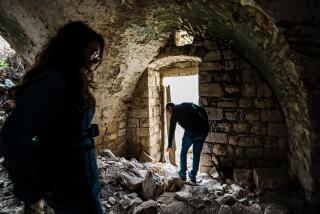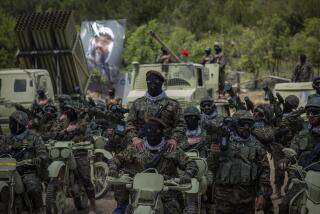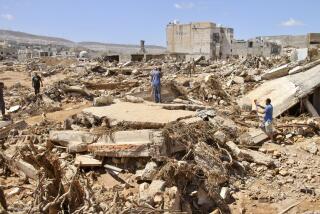Tear gas and clashes greet Lebanon’s new government

Enraged protesters in downtown Beirut rush to a square near parliament and storm barricades.
In the four months since widespread anti-government protests erupted, the Lebanese have danced and cheered in spasms of nationalistic pride. They’ve also blocked roads, smashed storefronts and nursed wounds in pitched battles against each other as well as Lebanon’s increasingly violent army and riot police.
Fresh dangers radiated through Wednesday, even after the first meeting of a new salvation Cabinet that leaders put forth to stem the existential crisis in a nation accustomed to navigating sectarian passions and shifting political fault lines.
The fledgling governmentwas meant to quell political dissent and ease anger over corruption and a troubled economy. Instead, protesters surged into downtown Beirut for another night of clashes in what for many was a rejection not only of the new government’s makeup, but also the system that birthed it.
“To the [protesters], it doesn’t matter,” said Faysal Itani, a deputy director at the Center for Global Policy, a Washington think tank, in an interview on Wednesday. “The benchmark for what is acceptable is so far from the likely reality that we are all placed on a collision course.”
That course had been set well before protests began in October. But the warnings in recent days have become more urgent: The country’s currency often stumbles to two-thirds — at times even to a third — of its value; government debt is gargantuan; and experts say the central bank’s reservesare minuscule.
The threat of imminent collapse sparked mostly peaceful protests. But over more than 12 weeks, they have morphed into civil disobedience against a political class that for many Lebanese is no longer tenable.
Even before the names of the Cabinet ministers had been announced, hundreds had assembled before the barricade on a street entrance to parliament.
Prime Minister Hassan Diab, a onetime education minister and an engineering professor at the American University of Beirut, insisted his government, staffed by what he called technocrats, “represent[ed] the aspirations of the demonstrators.”
But protesters dismissed it as an iteration of the same party politics that had plagued the country. Many of those chosen were relatively unknown faces, but almost had all had been linked to established parties. Some were perceived as lieutenants if not apparatchiks of leaders reviled by the protesters.
The Cabinet Diab announced was relatively lean, at 20 members. It has six women, one with the post of deputy prime minister as well as the post of defense minister. But there were missteps: One Cabinet member was given two ministries, culture and agriculture, a move that brought withering criticism from activists.
The formation of the Cabinet had been held up as a result of the venal horse-trading among Lebanon’s constantly squabbling sects over control of ministries. Allies of Saad Hariri, the country’s top Sunni Muslim politician and a supposed counterbalance to Hezbollah, the powerful Shiite political party and militant faction the U.S. designates as a terrorist group, were seen as having been edged out of power, Itani said.
Those grievances exploded into renewed clashes in downtown Beirut. A little after 5 p.m. Wednesday, enraged protesters rushed to a square near parliament and stormed barricades. Riot police backed by army troops marched in, pushing demonstrators into a main thoroughfare with water cannons and fusillades of tear gas.
By evening, the downtown area resembled an ancient battleground: two masses — one the army, the other the protesters — standing before each other until demonstrators advanced and tear gas streaked the darkness.
Protesters countered with a barrage of fireworks that flashed and thundered. The peppery scentof tear gas wafted blocks away. On the side, a young man smashed large bricks on the ground before throwing them toward the police.
“You’re coming here to watch? What do you think this is, a play?” said one riot-gear-clad policeman to a group of people walking in the area. He grabbed one of the men by the shoulder and asked for his ID.
Diab’s government is seeking international help, a task made harder if it’s perceived to have strong connections to Hezbollah. The group is supported by Iran, making it a target for Washington’s “maximum pressure” campaign on Tehran and its proxies.
The U.S., said Secretary of State Michael R. Pompeo, would support “a government that’s committed to reform,” but he avoided a direct rejection of the current Cabinet. “We want a non-corrupt government that reflects the will of the people of Lebanon,” he said in an interview with Bloomberg.
“If this government is responsive to that and there’s a new set of leaders that’s prepared to make those commitments and deliver on that, that’s the kind of government that we’ll support around the world and the kind of government we would support in Lebanon.”
For now, though, it’s the domestic enemies that may end up scuttling things. The new government still needs confirmation from parliament; even if it gets it, it’s unclear how quickly it could assert control, said Alain Tabourian, a former minister and businessman.
“They have no special prerogatives to rule with decree. If everything they do is going to be debated in parliament, and given the problems we are facing, the decisions we have to be taking, how can you execute it?”
Staff writer Tracy Wilkinson in Washington contributed to this report.
More to Read
Start your day right
Sign up for Essential California for news, features and recommendations from the L.A. Times and beyond in your inbox six days a week.
You may occasionally receive promotional content from the Los Angeles Times.







